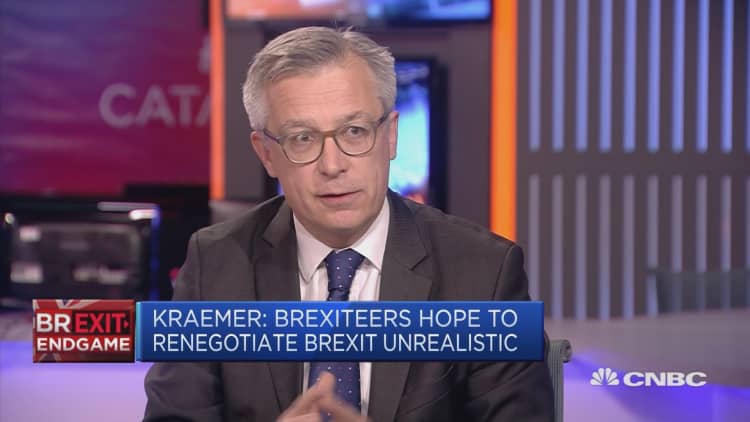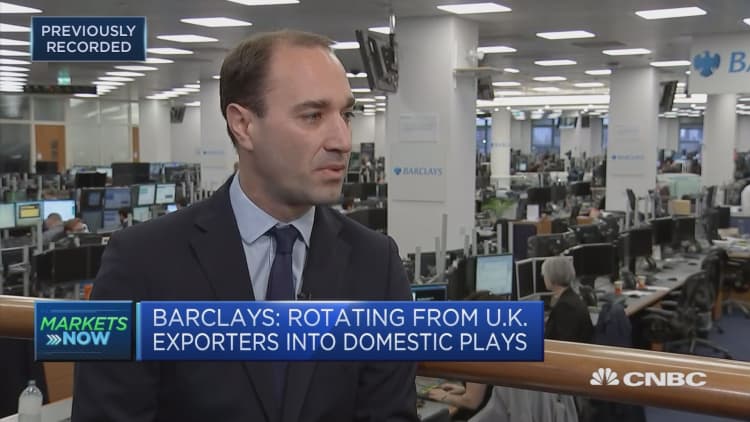
Market participants are finding it extremely difficult to fully appreciate the risk of the world's fifth-largest economy being thrust into the unknown post-Brexit, one strategist told CNBC on Monday.
His comments come at a time when British Prime Minister Theresa May is fighting for her political survival, after a draft divorce deal with the EU prompted a flurry of government ministers to resign.
Moritz Kraemer, former chief sovereign analyst at S&P ratings agency, told CNBC's "Squawk Box Europe" on Monday that, at current levels, it is clear markets remain underprepared for the prospect a no-deal Brexit.
When asked whether sterling and Britain's FTSE 100 index accurately reflected the risk of a no-deal scenario, Kraemer replied: "No, I don't think so."
"This is not fully incorporated, partly because markets understandably have a very hard time (trying) to assess what this would actually mean … We have never been through anything remotely similar," Kraemer said.
A no-deal scenario is generally considered to be where the U.K. crashes out of the EU without any formal relationship and has to rely on WTO trading rules.
The U.K. currency has largely been viewed as a barometer of fear during Brexit negotiations, with sterling suffering steep losses against the dollar last week amid heightened political turmoil.
On Monday afternoon, sterling was down around 0.1 percent against the dollar, trading at around $1.2831. The British currency was as high as $1.3176 earlier this month, before a draft deal struck with the EU prompted a wave of government resignations.
Intense scrutiny
The British government unveiled its long-awaited draft withdrawal agreement on Wednesday, which details the terms of the U.K.'s departure from the EU on March 29, 2019.
May is facing opposition from across the political spectrum to the proposed draft deal, which must be approved by Parliament, with critics saying it could leave Britain indefinitely tied to the EU post-Brexit.
In addition to protests from opposition lawmakers, May's draft Brexit proposal has come under intense scrutiny from many within her own Conservative Party and, crucially, from members of the Northern Irish party which props up her minority government.
In response to May's proposal, Britain's Brexit Secretary Dominic Raab resigned from his post on Thursday, prompting sterling to suffer its worst one-day fall against the euro since 2016.
A junior minister for Northern Ireland, Shailesh Vara, the Work and Pensions Secretary Esther McVey and Suella Braverman, a junior minister in Britain's Brexit Department, also submitted their resignations on Thursday morning.
Despite mutiny from some members of May's own party, leading Brexiteers in the cabinet have rallied behind the prime minister.
Relief rally
"We think the risk-reward for U.K. stocks is looking positive here, given the negativity expressed in the market," Emmanuel Cau, head of European equity strategy at Barclays, told CNBC's Julianna Tatelbaum on Monday.
"So, if we were to see a soft or no-deal Brexit — which is still our base case as a house — we do think that domestic stocks and FTSE 250 in particular will see a significant relief rally," he added.
When asked whether sharp declines in domestic homebuilders and some U.K.-focused banks last week should be viewed as an opportunity for market participants, Cau replied: "Yes, absolutely."
"Our advice for investors is not to overreact … It is going to be a very busy week for the U.K. and Europe in negotiating Brexit."

May is currently trying to rally enough lawmakers to back her plan to get it through Parliament, a daunting task given the broad criticism.
The EU is due to hold a summit to discuss the deal on Sunday.


